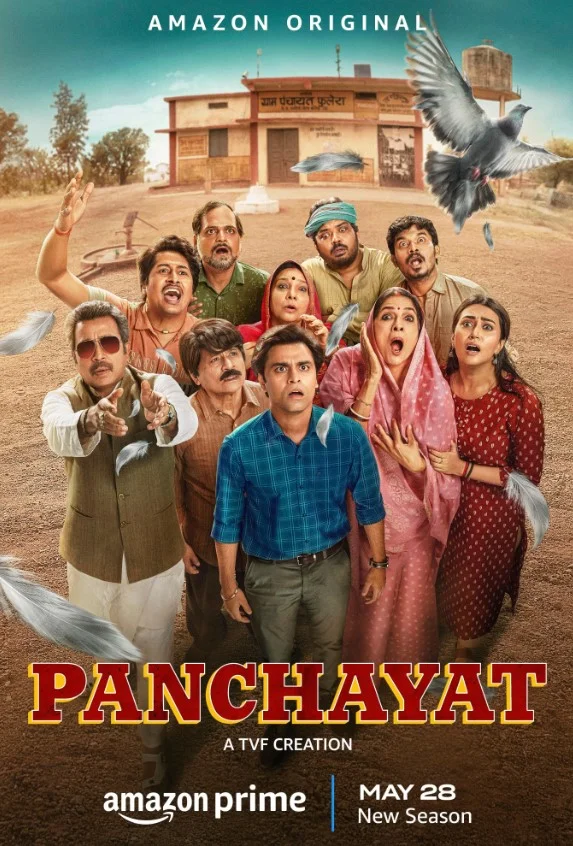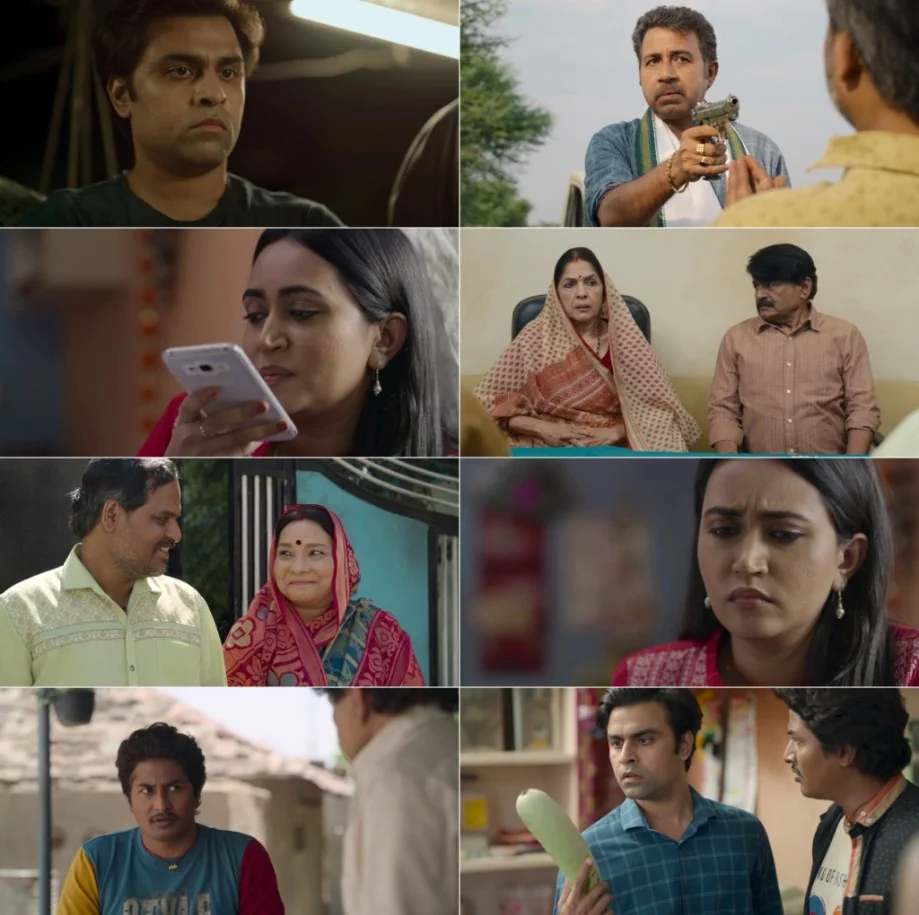Panchayat Season 3 (AmazonPrimeVideo) Story :-
The series continues to track the journey of Abhishek Tripathi (played by Jitendra Kumar), an engineering graduate who begins his tenure as a Panchayat secretary in the fictional rural village of Phulera, located in Uttar Pradesh.

Panchayat Season 3 (AmazonPrimeVideo) Release Date, Trailer, Songs, Cast
| Release Date | 28 May 2024 |
| Language | Hindi |
| Genre | Comedy, Drama |
| Episode | 8 |
| Cast | Jitendra Kumar, Neena Gupta, Raghubir Yadav, Faisal Malik, Chandan Roy, Sanvikaa, Durgesh Kumar, Ashok Pathak, Pankaj Jha, Gaurav Singh, Sunita Rajwar, Tripti Sahu, Shrikant Verma, Kusum Shastri |
| Director | Deepak Kumar Mishra |
| Writer | Chandan Kumar |
| Cinematography | Amitabha Singh |
| Music | Anurag Saikia |
| Producer | Shreyansh Pandey, Vijay Koshy |
| Production | Contagious Online Media Network, TVF Play, The Viral Fever |
| Certificate | 16+ |
Panchayat Season 3 (AmazonPrimeVideo) Review :-
TVF appears to possess a special knack for crafting shows that exude a comforting embrace, and this sentiment resonates strongly in the third season of Panchayat, the social comedy series that first debuted in 2020. With its latest installment, the show boasts exquisite writing, nuanced performances, and a surprisingly authentic portrayal of rural India, elevating its already impressive standard set by previous seasons. Prepare to experience a gamut of emotions – from smiles to tears, laughter to contemplation – and perhaps even a Google search on the government’s Pradhan Mantri Awas Yojana!
What sets this season apart is the removal of rose-tinted glasses. While the warm camaraderie among the protagonists remains, viewers are treated to a deeper exploration of their individual journeys, laden with emotional baggage and crises, prompting a significant shift in perspective. Political rivalries escalate, with their repercussions growing increasingly ominous. In essence, Panchayat’s third season punctures several glossy bubbles of utopian fantasy, offering poignant glimpses of hard-hitting reality.

Throughout the season, we witness Prahalad Chacha (portrayed by Faisal Malik) turning to alcohol as a means of coping with grief, Vikas (played by Chandan Roy) silently bearing the burden of financial woes, Abhishek (portrayed by Jitendra Kumar) struggling to detach himself from his deep-rooted connection to Phulera, and Brij Bhushan Dubey (played by Raghubir Yadav) enduring humiliation from political adversaries while also facing domestic discord.
At various points in the narrative, each character elicits sympathy, particularly Prahalad, whose soul is visibly crushed by the loss of his son. Faisal Malik’s exceptional performance vividly embodies this profound sorrow. A poignant scene in the third episode depicts him revealing the dilapidated state of his home—littered with despair, empty bottles, and shattered dreams—to convey the importance of family to another character, culminating in silent tears shared between them. This emotionally charged moment is crafted with sensitivity, likely to evoke a tearful response from viewers. Additionally, in a stirring sequence, Prahalad generously offers a substantial sum to aid in the construction of a road in Phulera, not only to ensure Pradhan ji’s electoral victory but also because he believes a man without purpose has no use for excessive wealth.
As the season unfolds, viewers will keenly feel the absence of the quartet’s “baithak” sessions, where life once seemed simpler over a few drinks. The emotional resonance of the narrative amplifies the impact of these lighthearted yet fulfilling moments, surpassing those of previous seasons. Through the intricacies of its characters’ interpersonal relationships, the show prompts contemplation on the friends inadvertently lost over time.
In this season, the budding romance between Rinki (portrayed by Sanvikaa) and Abhishek takes center stage. Their interactions are marked by subtle glances, coy smiles, playful banter, and moments of awkwardness. Fortunately, both Jitendra and Sanvikaa deliver commendable performances, steering clear of typical Bollywood melodrama, cheesy dialogues, and clichéd visual tropes.
While the primary cast delivers stellar performances as expected, it’s Jagmohan’s grandmother, portrayed by Abha Sharma, who steals the spotlight. Her vibrant portrayal injects a refreshing energy into every scene she graces. Sharma impeccably captures the essence of the quintessential “dadis” of Uttar Pradesh through her authentic accent, playful expressions, and mischievous body language.
Throughout the eight episodes, we encounter a myriad of colorful characters. Some familiar faces, such as the groom from the first season and his ill-mannered friend, make brief appearances. Despite the multitude of story arcs, the series maintains its signature slow-paced style, ensuring that each episode unfolds seamlessly without feeling overstuffed.
I was particularly impressed by the production design of the setting in Panchayat. It’s relatively uncommon in Indian cinema and television to depict rural areas with such authenticity. Often, rural depictions tend to be romanticized, with factual inaccuracies introduced in the name of creative freedom. However, Panchayat not only achieves authenticity but also surpasses its previous seasons in this regard. The show bridges the gap between commercial and art cinema, offering a faithful portrayal of hinterland India. From realistic households and everyday items to local brands and snacks served at celebrations, the depiction of Phulera is remarkably detailed, showcasing the rigorous effort invested in capturing rural life authentically.
A keen eye will catch numerous visual metaphors and gags throughout the show. For example, during accusations against Pradhan ji, his typically placid buffalo loses control. Abhishek consistently spills his tea just before pivotal moments, and Vidhayak, accused of eating a dog (admittedly, quite gross), has camels subtly displayed in his drawing room.
One standout scene features two opposing groups on the brink of confrontation, armed with batons, guns, and whatever else they can lay hands on. An official attempts to defuse the tension when a phone call blaring “Sara Jahan Se Achcha” interrupts, momentarily halting the impending chaos.
While I thoroughly enjoyed the show, I do have some reservations regarding the slight shift in its overall tone, with a greater emphasis on political dynamics this season. We encounter other elected members of the Panchayat, witness election discussions, attend official meetings, and even delve into Uttar Pradesh’s notorious gun culture.
Although this shift isn’t overly dramatic and doesn’t detract from the narrative, there’s a possibility that future seasons may lean further into political drama, as suggested by the finale’s cliffhanger. My hope is that, even if the show adopts a more political tone, it retains its raw emotional appeal and genuine portrayal of nuanced interpersonal relationships—the aspects that have been its strongest assets since its inception.





